FEBRUARY
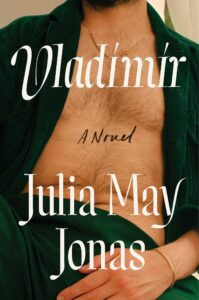
Julia May Jonas, Vladimir
Avid Reader Press, February 1
Oh snap. This debut novel is compulsively readable, deliciously wicked, and extremely fun—not least because it contains all of my favorite things: obsession, sex, academics, literary ambition (thwarted and non), a sharp-edged narrative voice that you can’t quite pin down (morally, anyway). It also contains something that I didn’t expect, though should have, considering the premise—a professor becomes infatuated with a new hire while her husband faces a termination hearing for sleeping with his students: a clear-eyed and judicious examination of the current social climate at universities. –ET
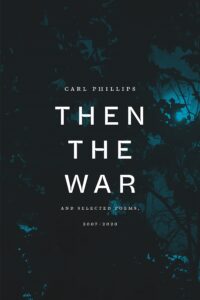
Carl Phillips, Then the War: and Selected Poems, 2007-2020
FSG, February 1
With the incomparably gorgeous, deftly poetic sentences that make up his work, Carl Phillips has been exploring intimacy, sexuality, and interiority for more than a decade. Then the War promises to be a treasure, including new poems as well as a selection of past work, the prose memoir “Among the Trees,” and the chapbook Star Map with Action Figures. –CS
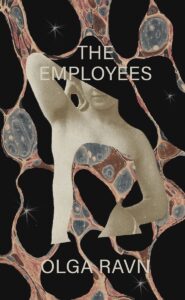
Olga Ravn, tr. Martin Aitken, The Employees: A Workplace Novel of the 22nd Century
New Directions, February 1
A spaceship, a workplace, a faded memory of Earth. Ravn’s sci-fi novel, made up of a series of witness statements, follows the Six-Thousand Ship and its human and not-quite-but-almost-human crew members. When objects from the planet New Discovery end up on the ship, the crew members develop a strange attachment to them, yearning for warmth and affection, the things and moments from Earth. Picking at the seams of productivity, Ravn’s novel ultimately illuminates the kinds of longings that sit at the center of human beings, and the complicated state of being human. –Snigdha Koirala, Editorial Fellow
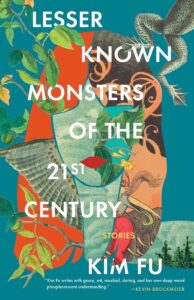
Kim Fu, Lesser Known Monsters of the 21st Century
Tin House, February 1
I love reading the descriptions of short story collections—they’re little treasure chests of weirdness. This one sold me on descriptions such as “a runaway bride encounters a sea monster” and “an insomniac is seduced by the Sandman.” I never knew I wanted to read a Sandman seduction story, but reader, I do. –ES
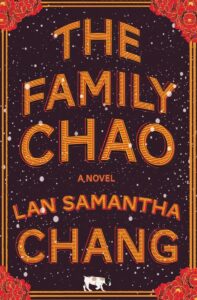
Lan Samantha Chang, The Family Chao
W.W. Norton, February 1
Chang’s latest novel—her first in a dozen years—is a reimagining of The Brothers Karamazov set in a family-owned Americanized Chinese restaurant in small-town Wisconsin. In a starred review, Publishers Weekly called the novel “timely, trenchant, and thoroughly entertaining.” I can’t wait to devour it. –JG
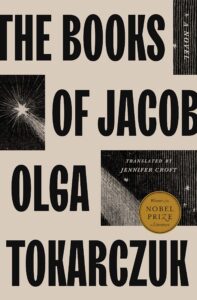
Olga Tokarczuk, tr. Jennifer Croft, The Books of Jacob
Riverhead, February 1
Nobel Prize winner Tokarczuk’s massive (seriously massive, at 995 pages) historical novel follows the rise and fall of a mysterious messianic religious leader in eighteenth century Europe. Jacob Frank traverses empires with his disciples – born Jewish, he converts to Islam, then Catholicism, is labeled both a heretic and a Messiah. The book was an instant best-seller and won Poland’s most prestigious literary prize, so despite the impressive bulk, this is at the top of my TBR list. –EF
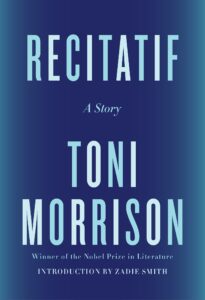
Toni Morrison, Recitatif: A Story
Knopf, February 1
First published in 1983 in Confirmation: An Anthology of African American Women, edited by Amiri Baraka and his wife Amina Baraka, Recitatif is the only short story written by the powerhouse novelist. The title is a reference to the French form of “recitative,” a musical styling that is often used in operas. The story centers on childhood friends Twyla and Roberta, who drift apart as they grow older. The former confidantes find that although they now believe in conflicting ideologies, there is still an indescribable bond between them. Morrison purposely doesn’t identify which woman is Black and which is white and described the story as “an experiment in the removal of all racial codes from a narrative about two characters of different races for whom racial identity is crucial.” Morrison’s sharp-eyed treatment of race, racism, and racial hierarchies remains relevant, digging deep into the marrow of society’s maladies. –VW
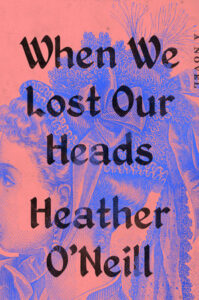
Heather O’Neill, When We Lost Our Heads
Riverhead Books, February 1
Heather O’Neill’s historical fiction novel combines two of my favorite topics: destructive female friendships and high society snobs behaving badly. Set in 19th-century Montreal, the narrative centers on Marie Antoine, the daughter of the richest man in the city, and Sadie Arnett, a scheming newcomer who seems to be cut from the cloth of Becky Sharp. The two frenemies lose touch and then later reconnect. Sex, lies, drama, deception, and glamour—sign me up! –VW
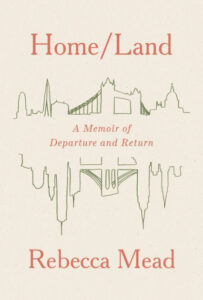
Rebecca Mead, Home/Land: A Memoir of Departure and Return
Knopf, February 8
Rebecca Mead, a New Yorker staff writer, brings us the story of resettling in one’s own homeland and reckoning with its changes over time. Mead moved back to London in 2018 after living in New York City for three decades, and this book, a reported memoir, portrays the evolution of her relationship with the city and her examination of what it has become. –CS
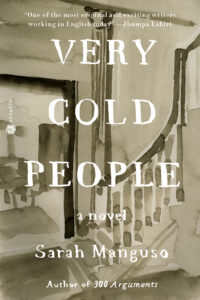
Sarah Manguso, Very Cold People
Hogarth, February 8
Sarah Manguso’s debut novel—need I say more? I mean, I will for posterity. Very Cold People (a title after my own heart) is about a girl named Ruthie reckoning with the sins and constraints of her small Massachusetts hometown. Manguso’s made a name for herself in nonfiction with her slim-yet-weighty lyrical books including The Guardians and 300 Arguments, and I can’t wait to see how her style translates to fiction. –ES
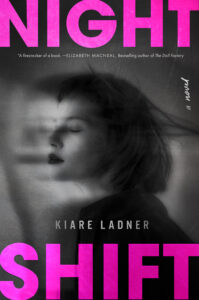
Kiare Ladner, Nightshift
Custom House, February 8
This exciting debut by Kiare Ladner revolves around the friendship between Meggie and Sabine—but possibly “friendship” is too strong a word. It’s more like a fixation, a decision on Meggie’s part to emulate and follow Sabine to the ends of the earth. Meggie meets Sabine at work, and even though Meggie seems to have all the facets of a good life (stable job, boyfriend, education), when she meets Sabine, she would, and does, throw it all away just for the chance to live alongside her. When Sabine trades her hours for the nightshift, so too does Meggie, and they begin living their nocturnal life together, exchanging the plain ease of daytime and boyfriends and normalcy, for the mystery and liminality of the night, and all it shrouds and reveals. –JH
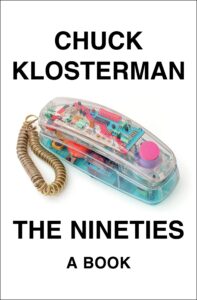
Chuck Klosterman, The Nineties
Penguin Press, February 8
I’ve loved Chuck Klosterman’s incisive cultural criticism ever since reading the absurdly fun Sex, Drugs, and Cocoa Puffs: A Low Culture Manifesto. Now, The Nineties promises a deep dive into the decade of grunge and the last one before the internet infiltrated every single part of how humans relate to one another. It’s an era that happened so recently that we still don’t understand it—and, in Kloserman’s view, this is the perfect time to try to make sense of it all. –CS
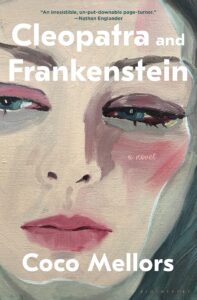
Coco Mellors, Cleopatra and Frankenstein
Bloomsbury, February 8
Cleo is a 24-year-old painter with an expiring student visa; Frank is 20 years older and financially stable (and then some). Their “impulsive marriage” sets off all sorts of reactions in their circle of friends and family—not to mention their individual reactions as they settle in as husband and wife. It’s giving me early-season Girls vibes, which I’m very much here for. –ES
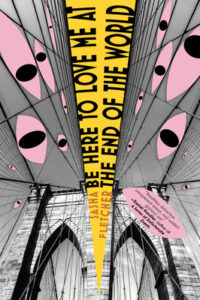
Sasha Fletcher, Be Here to Love Me at the End of the World
Melville House, February 8
Poet Sasha Fletcher’s debut novel is a love story (good) about a freelancer (relatable) in Brooklyn (yes) in winter (nice) with a strange President (classic). Says Alexandra Kleeman, “This book roils with beauty, with enthusiasm, with love for both the minuscule and oversized wonders of the world.” I believe her. –WC
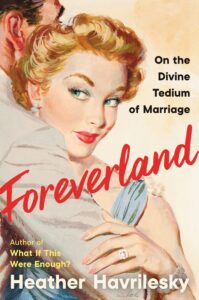
Heather Havrilesky, Foreverland: On the Divine Tedium of Marriage
Ecco, February 8
I’m a longtime fan of Heather Havrilesky’s “Ask Polly” columns (once at New York Magazine and now on her Substack); even when they’re about something specific and bonkers—like the person whose in-laws were trying to poison her with mushrooms—Havrilesky always manages to make them accessible, familiar, hilarious, and life-affirming. I expect nothing less from her new book, Foreverland, though it’s not a book of advice, per se. This time Havrilesky is turning towards herself—and her marriage and family—and revealing it to the world. She has woven these ideas in to her advice columns in the past, but never have we been treated to such a broad examination of modern marriage, with her own experiences at the core. Both married and unmarried audiences will find something to cherish in this book on what it means to have a good marriage, what a marriage is at all, and how to retain one’s identity, as well as desires, in the face of binding yourself to another. –JH
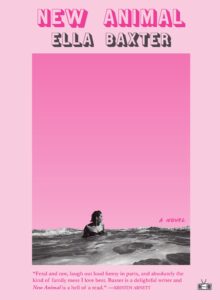
Ella Baxter, New Animal
Two Dollar Radio, February 15
In this raw, arresting novel, Amelia Aurelia—a cosmetic mortician—goes into a tailspin after the death of her mother. Included in the tailspin are: a trip to Tasmania, an uncertain communion with her birth father, dating apps, a BDSM club, kink-related paperwork, a horse head, painting a man’s face with menstrual blood, mean texts. Ultimately, is a book about something that seems obvious, but so often isn’t: the inextricability of mind and body, and the importance of our connections with other people. –ET
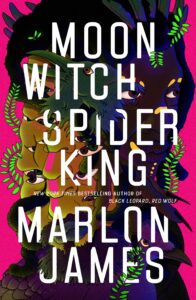
Marlon James, Moon Witch, Spider King
Riverhead, February 15
The second novel in Booker Prize-winner Marlon James’ Dark Star trilogy (aka his “African Game of Thrones”), Moon Witch, Spider King shifts its focus to Sogolon the Moon Witch (who, as you may recall, clashed with Tracker in the latter’s search for a disappeared boy in Black Leopard, Red Wolf). In this installment, Sogolon gives her own account of what happened to the boy, and of the century-long feud she had with the powerful and sinister Aesi, chancellor to the king. Told with James’ inimitable linguistic verve, this promises to be another riotous, ultraviolent, dazzlingly inventive epic in an already-groundbreaking saga. –DS
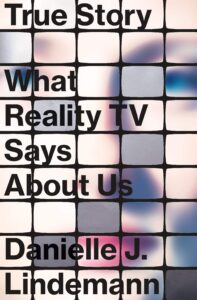
Danielle J. Lindemann, True Story: What Reality TV Says About Us
Farrar, Straus and Giroux, February 15
Like many people, when I need to detach my brain, I indulge in the absurdity of reality TV. I’m not a Real Housewives person, but I do dip into Bravo’s other offerings like Below Deck and Summer House. And as someone who is a self-identified pop culture nerd, I do think that our reactions and interpretations of reality TV can reflect our culture. Danielle J. Lindemann’s book seems like a sharp sociological analysis of how race, gender, and class intersect within the genre. –VW
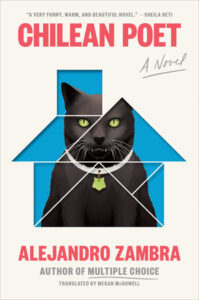
Alejandro Zambra, tr. Megan McDowell, Chilean Poet
Viking, February 15
Who doesn’t love a novel about poets? Poets are like regular people but with extra feelings; this is why they make incredible fictional subjects for love stories and tragedies and capers and mysteries and… all of the above? So I can’t wait to get my hands on Zambra’s latest, which advertises its subject matter in the title, and follows a young poet in Santiago, Chile as he navigates life among his two families, the chosen (poets!) and the actual (also poets). –JD
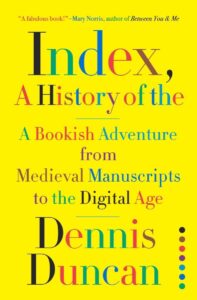
Dennis Duncan, Index, A History of the: A Bookish Adventure from Medieval Manuscripts to the Digital Age
W.W. Norton, February 15
Nowadays, we take the search function for granted; but it was a long road to get here. Dennis Duncan’s full-length nonfiction debut catalogues the life of the index, the humble but mighty index, from thirteenth-century European monasteries to present-day Silicon Valley. As the ways we read expand and morph—into ebooks, Substacks, Patreons, NFTs—it’s worth taking a look back at the history of how we’ve organized what we know. It’s the age of information, but it always has been. –WC
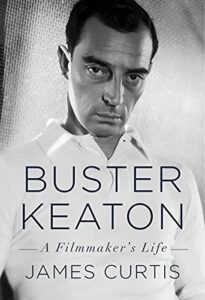
James Curtis, Buster Keaton: A Filmmaker’s Life
Knopf, February 15
It always seems that multiple books about an icon emerge at the same moment: and it is now filmmaker and actor Buster Keaton’s time to shine. Curtis’s offering is a definitive biography that delves into the mystery behind the man who made America laugh in the early years of film. Curtis, the author of biographies of stars like Spencer Tracy and W.C. Fields, now turns his gaze on Keaton, telling stories of his early vaudeville years with his family, contract disputes, his struggle with drinking, and problematic ex-lovers. –JH
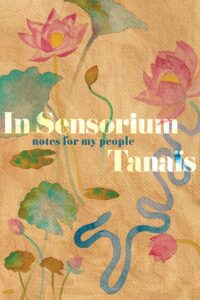
Tanaïs, In Sensorium: Notes for My People
Mariner Books, February 22
The power of scent, specifically its ability to preserve memories, cannot be overstated. I love my little collection of perfumes and get the same amount of delight and satisfaction out of the “low-end” celebrity perfumes (Princess of Pop Britney Spears really does have some nice, inexpensive perfumes!) as I do the opulent designer offerings (I’m coming for you, Tom Ford’s Black Orchid!). Using their personal experiences and identity as an American Bangladeshi Muslim as a narrative framework, Tanaïs examines the role of fragrance in South Asian history. Tanaïs is also an independent perfumer and beauty designer, so I’m interested in seeing how they blend their industry knowledge with the vulnerability of memoir. –VW
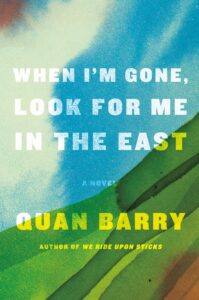
Quan Barry, When I’m Gone, Look for Me in the East
Pantheon, February 22
This novel couldn’t be any more different from Quan Barry’s deliciously irreverent 2020 novel We Ride Upon Sticks—except that it is similarly excellent, and similarly immersive, a full-throated plunge into a very specific, fascinating world. When I’m Gone, Look for Me in the East is technically about twin brothers—one of whom is a monk, the other a former monk—on a quest to find the reincarnation of a famous lama in Mongolia, but it is really much more about Buddhism, love, and the metaphysics of being. –ET
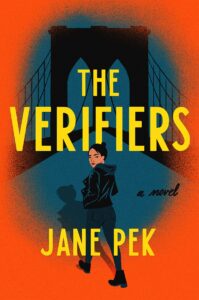
Jane Pek, The Verifiers
Vintage, February 22
I first became familiar with Jane Pek after reading her short story “Portrait of Two Young Ladies in White and Green Robes (Unidentified Artist, circa Sixteenth Century)” in Conjunctions. I was so taken in by her descriptive language and lush, immersive imagery. The story’s narrator is unabashedly vulnerable, her confessions loaded with the heaviness of regret. Pek’s debut novel is a contemporary mystery and centers on amateur sleuth Claudia Lin, who defies her parents’ traditional gender roles and gets a job at a dating detective agency. When a client disappears, Claudia finds herself entangled in a web of deceit. Pek has already proven that she’s adept at crafting the rich inner world of her characters, so I’m looking forward to her take on genre fiction. –VW
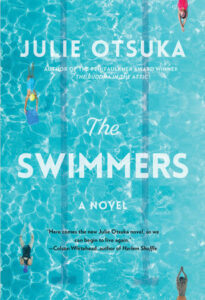
Julie Otsuka, The Swimmers
Knopf, February 22
I remember the exact moment I read the opening pages of The Buddha in the Attic. I was in the Union Square Barnes and Noble and I opened a book on the new releases table. I had finished my first year of an MFA and was pretty sure I knew what writers were allowed to do. I ended up reading half that novel, standing at that same table, a story written in first person plural about Japanese picture brides immigrating to America in the early 1900s. It was beautiful and perfect, and now we get The Swimmers. Otsuka’s new novel is about a group of (rather obsessed) recreation swimmers and what happens when a crack appears at the bottom of their pool. Alice, one of the swimmers who is cast out into non-pool life, must then grapple with haunting memories of her childhood and the Japanese American internment camp as well as the reappearance of her estranged daughter. Otsuka is a beautiful writer and The Swimmers promises to be brilliant. –EF
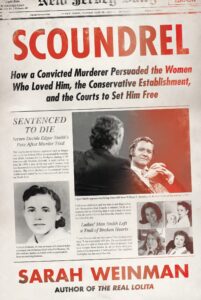
Sarah Weinman, Scoundrel: How a Convicted Murderer Persuaded the Women Who Loved Him, the Conservative Establishment, and the Courts to Set Him Free
Ecco, February 22
In 1957, a teenage girl named Victoria Zielinski was murdered by a man named Edgar Smith. For the duration of the 60s, while in prison for the crime, Smith wrote numerous pleas for the overturning of the conviction, including to William F. Buckley Jr. In 1971, Edgar Smith was released, in large part thanks to Buckley, who led a campaign on his behalf, being apparently unable to believe that someone who held him (and his conservative beliefs) in such high regard could be a murderer. In 1976, Smith attempted murder again, and was finally shut away for life. Sarah Weinman does an impeccable job with this wild story of murder, celebrity, politics, and the American ability to put unsavory characters on a pedestal. –JH



